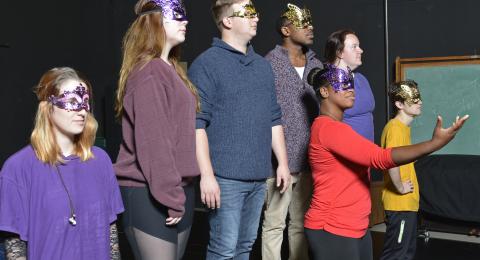Grants encourage SUNY faculty to use open-source course materials
Office of Communications and Marketing
Published
Recognizing that textbooks and courseware have become issues of affordability and access to a college education for many students, SUNY Oswego faculty members have joined a State University of New York initiative to boost availability of and support for materials that students can freely or less expensively use.
While not a new concept, the availability of open educational resources (OER) -- course materials that are either low or no cost and, often, subject to a less restrictive Creative Commons license -- marks a trend that has reached new adherents among faculty at Oswego and around SUNY, thanks in part to $8 million in this year's state budget for SUNY and CUNY to encourage OER's use.
"OER adoption can be framed as an act of social justice," said Laura Harris, the college's online learning librarian and one of the campus leads for OER initiatives. "Steep textbook prices mean that many students go without, while others don't receive their textbooks until after classes begin. Using OERs means access for everyone, from day one."
Open educational resources are not just textbooks. They can include any open-source material that a class creates, accesses or pays substantially less for, including digital archives, software, hardware, data, course templates -- even entire courses.
SUNY OER Services -- born of an effort begun in 2012 to create a library of Open SUNY textbooks -- held a daylong workshop at Oswego recently, attracting attendees from several four-year and community colleges in the region. The office provides guidance on using curated OER content, course supports and instructional technology development and design.
Alexis Clifton, executive director of SUNY OER Services, cited studies that show textbook cost can be so daunting to some students, it can inhibit not only what courses they take, but their ability to stay in school and persist to graduation.
SUNY Oswego theatre faculty member Mya Brown, recalling the cost of textbooks, said, "I was a student myself not so long ago, and I remember what it was like. I think it is the responsibility of educators to make educational resources more accessible and affordable."
Shakespeare resource
Brown applied for and received two grants from Oswego's share of the state money for OER. One enabled her to restructure the way she teaches and assesses students in her "Introduction to Theatre" course. Among the steps she took was adopting "Theatrical Worlds" as the textbook, available digitally for educational use under a Creative Commons license. Creative Commons gives everyone, from individual creators to large companies and institutions, a simple and standardized way to grant copyright permissions to their creative work.
The other grant supports Brown's "Acting Shakespeare" class's project to create a database of monologues from Shakespearean plays, complete with scene synopsis, character breakdowns and a glossary -- a resource that will be freely available to future students.
"We wanted to take it a step further than a typical monologue database," Brown said. "We didn't find any that were just right for us."
SUNY Oswego offices partnering in the OER initiative are Penfield Library, the Center for Excellence in Learning and Teaching (CELT), Campus Technology Services and the Division of Extended Learning and its instructional designers. The partners' steering group announced that, besides Brown, faculty members who won first-round OER grants for their course proposals are Elizabeth Bishop, Brian Moritz, Jessica Reeher and Lisa Seppi.
Reeher, a communication studies faculty member, said she's redeveloping her "Rhetoric of Film" course for spring semester -- without a traditional textbook. "The plan is to develop the course to expand my lectures in a robust way," she said. Reeher listed notes, videos and 20 or so readings among the OER complement, using library materials to cover any gaps.
Working with instructional designer Kristen Flint, Reeher wants to make sure that the online version of the course has other components in place, to reach online learners as effectively as she does with the in-person class.
Opening doors
Rameen Mohammadi, associate provost for undergraduate and special programs, endorsed OER efforts. "If the grants are drawing people to try open educational resources, that's fantastic," he said. "I really see no drawbacks."
The philosophy ought to be to reduce the cost of course materials to as close to zero as possible, Mohammadi said. "If a book is essential and, perhaps, there's no other way around it, then try to reduce the cost," he said.
John Kane, director of CELT, said providing OER for courses can reduce faculty frustrations and performance issues for students waiting for resellers to deliver used books or for reluctant classmates to make the purchase.
"Day one access is so important," he said. "If you fall behind early in a course, you're more likely to stay behind."



